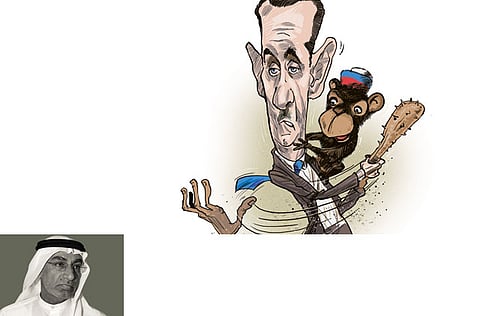No intervention in Syria amounts to bad intervention
There's a need to provide political support for the opposition and logistical backing to the Free Syrian Army

As the Syrian uprising enters its second year and probably the last 30 minutes of the hour it is bound to get tough and more complicated as well as invite more international attention and foreign intervention.
President Bashar Al Assad and his immediate family intend to stay in power and fight to the last bullet. For Al Assad, just as it was the case with Libyan dictator Muammar Gaddafi, who resisted to the last minute of the hour and fought to his death, it is a classic case of either ‘kill or be killed'. The military solution is the only solution for dictators nearly everywhere. The reality of the situation is, of course, the militarisation of the Syrian uprising which came about only lately. It was the preferred option of the regime from day one when the regime decided on an all-out onslaught against the civilians.
The ‘kill or be killed' mentality is not going to change one bit at this late moment of the Syrian uprising. Al Assad, who is trying hard to prove himself fully reliable to his immediate family, was never interested in a political solution. He has cleverly accepted UN-Arab envoy Kofi Annan's six-point plan so as to buy time to reload and divide the international community. Annan's plan won't end the Syrian crisis; if anything, it will make it worse.
The most likely scenario for Syria is going from bad to worse. Expect more bad news and more — and not less — violence. The worst of regime violence is yet to come. The average daily killing has increased from 20-40 people killed during 2011 to 80-100 in 2012. The total number of people killed is close to 10,000 and there is no end in sight. The Al Assad regime's bloody military crackdown in Homs and Idlib will be repeated all over Syria.
Al Assad still has the solid backing of the Syrian army and the civilian thugs widely known as the ‘shabiha'. The Syrian president also counts on Iran's unwavering political and logistical support. To Al Assad, Iran is just as politically indispensable as the support of the regular army staffed by Alawite officers. But Al Assad has found in Russia an unexpected foreign ally that provided him iron-clad diplomatic protection during the first half of the hour of his fight to survive. Russia has delivered two vetoes in the UN Security Council on his behalf. It will not hesitate to deliver a third if needed. It has kept the arms supply responsible for killing civilians running nonstop. Russia insists it is in principle against foreign intervention, especially western military intervention. Sadly there is already plenty of Russian intervention of the worst kind in Syrian affairs. Al Assad probably would not have lasted for so long and the misery of the Syrians would have been over in no time if it was not for the direct Russian intervention in Syria.
Wrong side of history
Russia is the foreign power with the most intervention of the wrong kind in Syria at the moment. Indeed intervention is winning over no intervention, and bad intervention is overwhelming good intervention. No wonder Russia tops the new list of enemies of the Arab world. It visibly stands on the wrong side of history and justice. But while the Syrian regime can count on Russian protection, the people in Syria can't count on a similar solid support from the international community. It is disappointingly hesitant to shoulder its moral and political responsibility to protect the Syrian people, who are putting the good fight for the noblest of all causes — freedom and democracy. They are fighting the fight and no one can accuse them of not putting up the good fight. They are out in the street every single day for the past 400 days facing bullets every time they go out. The Syrian people are fighting on two fronts simultaneously — against a brutal regime and bad foreign intervention. At this stage all they ask from the international community is to keep the Russian monkey off their back. This is the job of the international community, mostly western capitals. They call for good intervention, which has been lacking so far. Failure to help the Syrian people in effect means helping Al Assad stay in power a bit longer.
Ideally the business of Syrians and indeed the business of the Arab world should always stay the business of Syria and the Arab world. This region has a long history of self-serving foreign interventions and people are rightly suspicious of foreign interventions, even of the best kind, namely humanitarian ones.
But in the case of Syrian uprising no intervention is turning out to be bad intervention. It only prolongs the misery of the people in Syria. The international community should work with the Arab League. That is the good intervention needed at the moment. It simply implies providing moral solidarity for the Syrians, political support for the opposition and helping them to unite, and finally logistical support of all kind to the Free Syrian Army. Russia should not get away with the ‘no-intervention' nonsense. As the uprising approaches the last 30 minutes of the hour, this is certainly not the time for the international community to turn its back on Syria.
Dr Abdulkhaleq Abdulla is Professor of Political Science. You can follow him on Twitter at www.twitter.com/Abdulkhaleq_UAE



